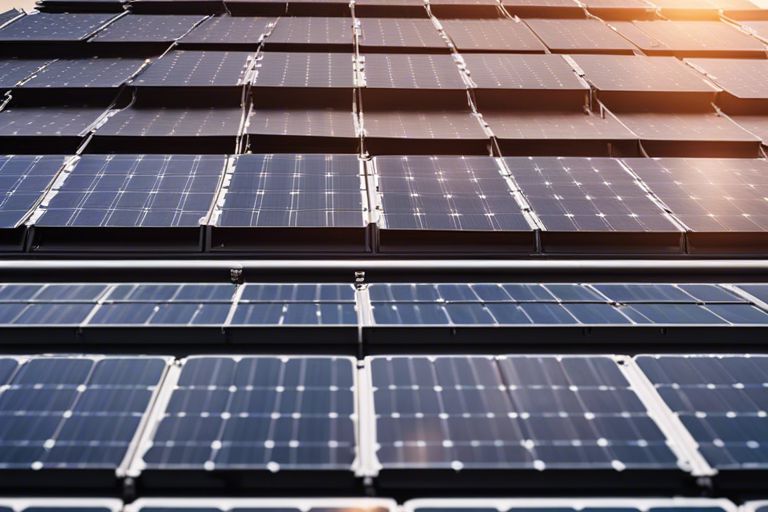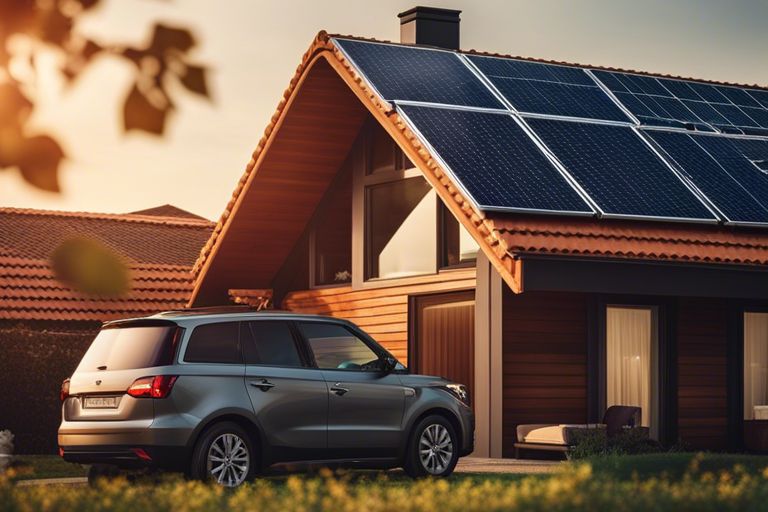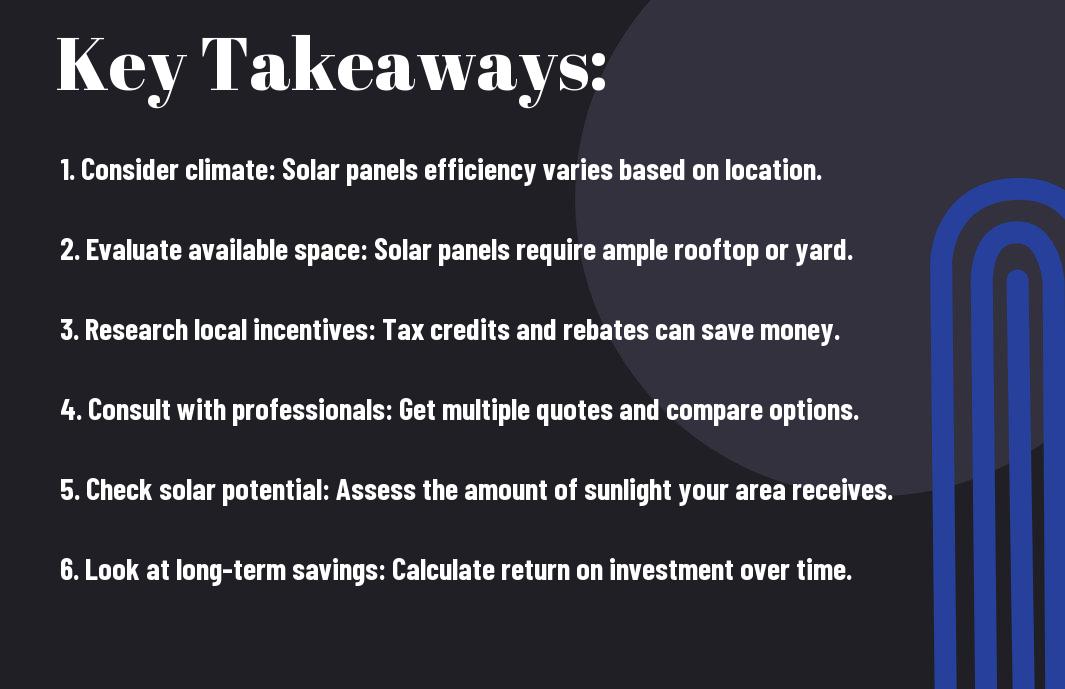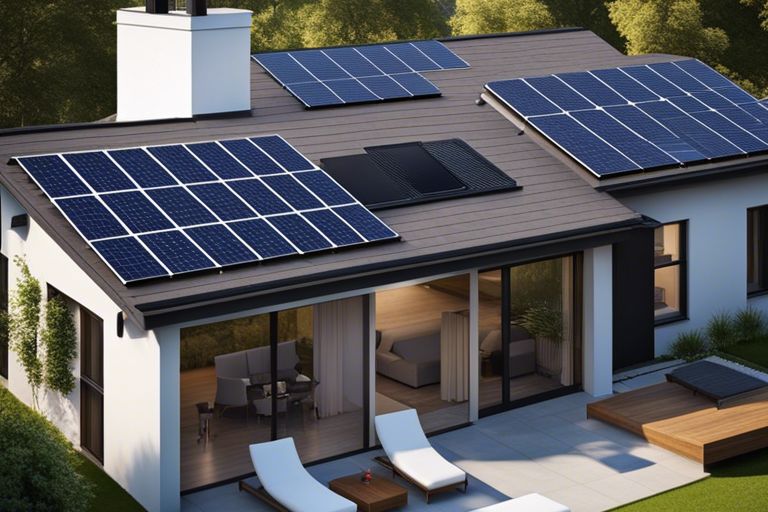Overwhelmed by the variety of solar systems available for your home? Let’s navigate the solar system galaxy together, exploring the pros and cons of each option. From grid-tied systems that save you money to off-grid systems that offer independence, learn which solar system best suits your home’s needs. Harnessing the power of the sun has never been easier – it’s time to find the perfect solar system for you!

Key Takeaways:
- Location matters: Choose a solar system based on your location’s sunlight exposure and weather conditions.
- Consider the size of your home: Depending on the size of your home, you may need a larger or smaller solar system to meet your energy needs.
- Cost and incentives: Research the cost of installing and maintaining different solar systems, as well as any potential incentives or tax credits available in your area.

Types of Solar Systems
To harness solar power for your home, you have several options when it comes to solar systems. Here are the main types of solar systems that you can consider for your home setup:
| Grid-Tied Solar Systems | Off-Grid Solar Systems |
| Hybrid Solar Systems |
Grid-Tied Solar Systems
Types of Grid-Tied Solar Systems include those that are directly connected to the electricity grid. These systems allow you to use solar energy during the day and switch to grid power at night or when your energy demand exceeds what your solar panels can produce.
Recognizing the benefits of Grid-Tied Solar Systems, such as lower costs due to not requiring battery storage, these setups are popular among homeowners looking to reduce their electricity bills and environmental impact.
Off-Grid Solar Systems
Solar panels, a battery bank, and other imperative components are included in Off-Grid Solar Systems. These systems are ideal for homes in remote areas where connections to the main power grid are not available or are too costly to install. By relying solely on solar energy and stored power, you can maintain electricity supply independently.
Solar panels capture sunlight, which is then converted into electricity to power your home. Access to reliable energy, even in off-grid locations, is a significant advantage of Off-Grid Solar Systems. By harnessing the power of the sun, you can enjoy sustainable and self-sufficient living.
Hybrid Solar Systems
Hybrid Solar Systems combine the best of both Grid-Tied and Off-Grid setups. These systems are connected to the grid but also have battery storage to store excess energy generated by your solar panels. This stored energy can be used during power outages or at night when your panels are not producing electricity.
When looking at Hybrid Solar Systems, you’ll find that they offer flexibility and reliability. By integrating grid power with battery storage and solar energy, you can maximize your energy savings and ensure a continuous power supply, regardless of external factors.
Key Considerations
Energy Efficiency
Assuming you are looking to reduce your carbon footprint and lower your energy bills, energy efficiency should be a crucial factor in selecting the best solar system for your home. Any solar system you consider should be able to harness as much solar energy as possible and convert it into electricity effectively. Look for solar panels with high efficiency ratings to ensure maximum energy production for your household needs.
Cost and Budget
Efficiency is important, but so is the cost of the solar system and how it fits into your budget. Any decision you make should take into account the upfront costs of purchasing and installing the solar system, as well as any long-term savings on your energy bills. It’s necessary to weigh the initial investment against the potential savings over the years to determine the cost-effectiveness of the solar system you choose.
When considering the cost and budget for a solar system, also keep in mind any available incentives, rebates, or financing options that could help offset the initial expenses. Some regions offer tax credits or other financial incentives for installing solar panels, making it more affordable for homeowners to go solar.
Space and Installation Requirements
For homeowners with limited roof space or specific installation requirements, it’s necessary to consider how different solar systems will fit your needs. When evaluating solar options, take into account the size and layout of your roof, as well as any shading issues that could affect solar panel performance. Different solar systems may have varying space requirements, so choose one that aligns with your available space and installation preferences.
Installation of a solar system can also vary depending on the type of system you choose. Some systems may require more complex installation processes, while others may be more straightforward and easier to set up. Consider your comfort level with DIY projects and your willingness to hire professionals for the installation to ensure a smooth and efficient process.
Popular Solar Panel Brands
Keep The Best Solar Panels for Homes in 2024 – MarketWatch handy as you explore the popular solar panel brands available for your home.
Tesla Solar Panels
Panels from Tesla are renowned for their sleek design and cutting-edge technology. By integrating solar panels with Tesla Powerwall batteries, you can store excess energy for use during peak hours or in case of a power outage. Tesla’s panels are known for their durability and efficiency, making them a popular choice among homeowners looking to harness solar power.
SunPower Solar Panels
With SunPower solar panels, you can expect top-tier efficiency and performance. These panels are designed to maximize energy production in limited space and under challenging conditions. SunPower offers a wide range of options to suit your specific energy needs, whether you are looking to partially offset your electricity usage or go completely off-grid.
SunPower panels are backed by a solid warranty, giving you peace of mind that your investment is protected. Their sleek black design adds a touch of elegance to your home while contributing to a sustainable future.
Panasonic Solar Panels
Tesla has partnered with Panasonic to offer high-quality solar panels that are both efficient and reliable. Panasonic panels are known for their high conversion efficiency, ensuring that you get the most out of the sunlight hitting your roof. These panels are designed to withstand various weather conditions, making them a durable choice for your home.
Brands like Panasonic are paving the way for renewable energy adoption, providing homeowners like you with the opportunity to reduce their carbon footprint and save on electricity bills in the long run.
System Size and Configuration
Determining Your Energy Needs
Now, one of the key factors to consider when choosing a solar system for your home is determining your energy needs. This involves analyzing your electricity consumption patterns, the size of your home, and the number of occupants. By understanding your energy needs, you can more accurately size your solar system to ensure it meets your requirements.
Configuring Your Solar Array
Your solar array configuration plays a crucial role in maximizing the efficiency of your system. Factors such as the tilt angle of the panels, shading from nearby trees or buildings, and the orientation towards the sun can all impact the performance of your solar array. It’s crucial to work with a professional installer to design a system that is tailored to your specific site conditions and energy goals.
Understanding how to configure your solar array correctly can make a significant difference in the amount of energy your system generates. By optimizing the placement and angle of your solar panels, you can harness more sunlight and increase the overall efficiency of your system.
Inverter and Battery Options
To ensure your solar system operates efficiently, you need to carefully consider your inverter and battery options. The inverter is responsible for converting the direct current (DC) electricity generated by your panels into usable alternating current (AC) electricity for your home. Batteries, on the other hand, store excess energy produced during the day for use at night or during periods of low sunlight.
With the right inverter and battery options, you can enhance the performance and reliability of your solar system. Choosing high-quality components that are compatible with your system size and energy needs is crucial for maximizing the benefits of solar power in your home.
Installation and Maintenance
Professional Installation vs. DIY
To ensure the successful installation and optimal performance of your solar system, it is crucial to consider whether to opt for professional installation or pursue a DIY approach. While DIY installation may seem cost-effective and empowering, it can be complex and risky without the necessary expertise. Professionals bring specialized knowledge, experience, and equipment to ensure safe and efficient installation tailored to your home’s specific needs.
Ongoing Maintenance and Repair
Any solar system requires regular maintenance to ensure longevity and efficiency. This includes cleaning solar panels, checking for any debris or shading that may affect performance, and inspecting the system for any signs of wear or malfunction. Prompt repairs are necessary to prevent minor issues from escalating and to maximize the system’s lifespan.
The key to efficient solar system operation is consistent upkeep and addressing any maintenance or repair needs promptly. By staying proactive and vigilant in monitoring your system, you can ensure it continues to generate clean energy for your home effectively.
Warranty and Support Options
Any reputable solar system provider should offer warranty and support options to safeguard your investment. These can vary widely, so it’s necessary to carefully review the terms and coverage provided. A solid warranty can provide peace of mind knowing that any unexpected issues or malfunctions will be addressed without incurring additional costs.
Another important aspect to consider is the availability and quality of customer support from the solar system provider. Responsive and knowledgeable support can make a significant difference in addressing any concerns or issues that may arise with your system, ensuring a smooth and efficient energy production experience.
Benefits and Drawbacks
Environmental Benefits
For environmental enthusiasts like you, switching to a solar system for your home brings a myriad of benefits. By harnessing the power of the sun, you can significantly reduce your carbon footprint and lower your dependency on fossil fuels. Solar energy is a clean and renewable source that produces no greenhouse gas emissions, helping to combat climate change and protect our planet for future generations.
Cost Savings and ROI
For those looking to save money in the long run, installing a solar system on your home can lead to substantial cost savings. With the rising costs of traditional electricity, generating your own power from the sun can help you offset or even eliminate your monthly utility bills. Additionally, many governments and utility companies offer financial incentives and tax credits for solar installations, improving your return on investment.
Furthermore, as the technology advances and becomes more affordable, the return on investment for solar systems continues to improve. In addition to saving on your electricity bills, a solar system can increase the value of your home should you decide to sell in the future.
Drawbacks
Potential Drawbacks and Limitations
An important consideration for you is the potential drawbacks and limitations of installing a solar system for your home. Factors such as upfront costs, space requirements for panels, and efficiency limitations based on your location and climate can impact the feasibility of solar energy for your specific situation. Additionally, solar panels require periodic maintenance and cleaning to ensure optimal performance, which may require additional time and effort on your part.
The technology of solar systems is constantly evolving, so investing in a system now may mean missing out on more efficient or cost-effective options in the future. It’s crucial to weigh these drawbacks against the benefits to determine if a solar system is the best choice for your home.

Final Words
With this in mind, when deciding on the best solar system for your home, it’s vital to consider your energy needs, budget, and available space. Whether you opt for a grid-tied, off-grid, or hybrid system, each has its advantages and limitations. By weighing these factors carefully and consulting with solar experts, you can make an informed decision that not only benefits your wallet but also the environment.
Q: What factors should I consider when choosing a solar system for my home?
A: When choosing a solar system for your home, consider factors such as your energy usage, roof space availability, budget, desired energy output, and local weather conditions.
Q: What are the different types of solar systems available for homes?
A: The main types of solar systems for homes are grid-tied, off-grid, and hybrid systems. Grid-tied systems are connected to the local utility grid, off-grid systems are standalone and not connected to the grid, and hybrid systems combine both grid-tied and off-grid functionalities.
Q: How do I determine the size of the solar system needed for my home?
A: The size of the solar system needed for your home depends on your average daily energy consumption, the amount of sunlight your location receives, the efficiency of the solar panels, and whether you want to offset all or just a portion of your electricity usage.
Q: Which solar panels are best for residential use?
A: Some popular solar panel brands for residential use include SunPower, LG, Panasonic, and Canadian Solar. It’s important to consider factors such as efficiency, durability, warranty, and cost when choosing the best solar panels for your home.
Q: Are there any incentives or rebates available for installing a solar system in my home?
A: Yes, there are various incentives and rebates available for installing a solar system in your home, such as federal tax credits, state rebates, net metering programs, and solar renewable energy certificates (SRECs). These incentives can help offset the cost of installing a solar system and make it more affordable for homeowners.
